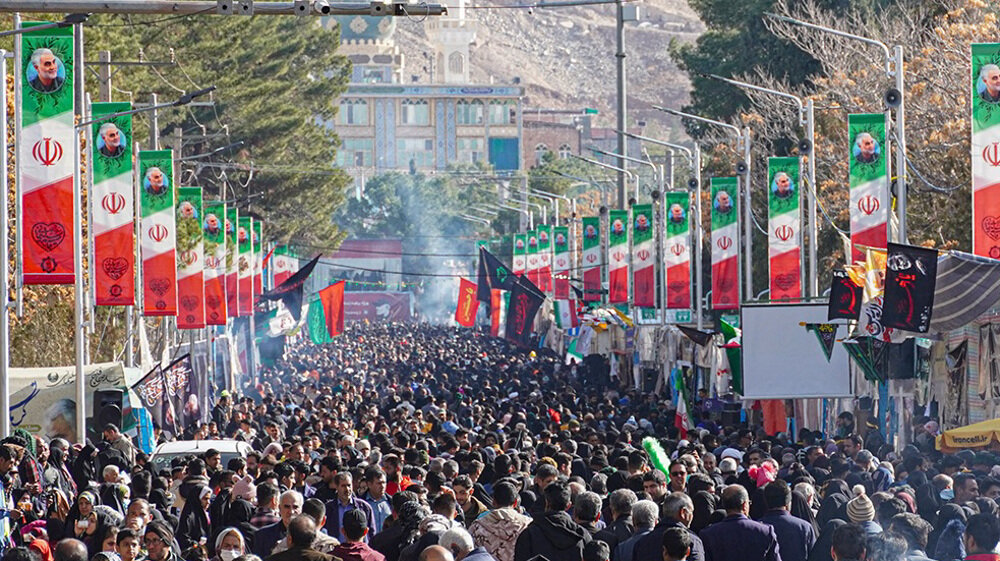Iranians pay tribute to Gen. Soleimani

TEHRAN- Thousands of Iranians from all walks of life have gathered in the southeast province of Kerman to honor anti-terror hero General Qassem Soleimani, who was assassinated in 2020 in the Iraqi capital of Baghdad by a U.S. drone attack along with several of his closest companions.
General Soleimani’s hometown and burial site hosted a deluge of the legendary commander’s lovers, followers and various social strata on Wednesday on his fourth martyrdom anniversary.
Kerman’s authorities announced that 1,300 distinguished experts and lecturers will recount General Soleimani’s sacrifices on the occasion of his martyrdom anniversary, as well as a convention of 13 discussion forums and the printing of 1,000 volumes of books centered on his character and school of thought.
Additionally, compared to the previous year, the province authorities anticipated a thirty-percent rise in pilgrims and tourists to General Soleimani’s final resting place.
On January 3, 2020, a U.S. drone strike authorized by then-U.S. President Donald Trump assassinated General Soleimani, commander of Iran’s Islamic Revolution Guards Corps (IRGC), and his companion Abu Mahdi al-Muhandis, second-in-command of Iraq’s Popular Mobilization Units (PMU), as well as their companions. The strike took place close to Baghdad International Airport.
Due to their crucial contributions to the battle against the Daesh Takfiri terrorist group in West Asia, notably in Iraq and Syria, both commanders were held in the highest regard throughout the region.
Less than a week after the incident, a bill mandating the government to remove all foreign forces commanded by the United States from Iraq was adopted by the parliament.
In response to General Soleimani’s assassination the IRGC also launched a barrage of missile strikes against the U.S.-run Ain al-Asad facility in the western province of Anbar, Iraq.
Assassination trial of Ge. Soleimani will take place in two months
The Iranian judiciary-affiliated news agency Mizan said on Wednesday that Kazem Gharibabadi, the secretary of Iran’s High Council for Human Rights, will be testifying in court on General Soleimani’s U.S. assassination within the next two to three months.
“If the defendants do not introduce a lawyer, the court will appoint a lawyer for them,” Gharibabadi emphasized, highlighting that the Islamic Republic had notified the American defendants that they might attend in court and defend themselves or appoint a lawyer for themselves.
Iran’s top human rights official maintained that during a recent visit, an Iraqi delegation assured Tehran that they will soon complete their investigations and submit an indictment with the court.
“We are in constant contact and negotiation with Iraq and we asked them to finish the investigations as soon as possible and submit their indictment to the court,” he said.
Gharibabadi voiced hope that the court’s first session will take place in the next two to three months.
On Monday, the Iranian Foreign Ministry tendered the U.S. government with a second official notification, seeking arbitration for the assassination of General Soleimani.
Tavakkol Habibzadeh, the head of center for Iranian President’s Legal and International Affairs, said that the second notice was written and sent after the United States failed to respond to the first one on holding negotiations.
The notification requesting arbitration was drafted in accordance with the Protection of Diplomats Convention, a 1973 United Nations anti-terrorism treaty aimed at preventing and punishing crimes against internationally protected individuals, including diplomatic agents.
According to Article 13 of the convention, the first notice seeking negotiation is delivered to the opposing party, and if it does not answer, the second letter requesting arbitration is issued.
According to the convention, if the Americans do not respond within six months of the date of the request for arbitration, the next step would be followed, which is to bring the matter to the International Court of Justice, he added.
Habibzadeh stated that the Iranian Foreign Ministry issued the second notification to the U.S. to request arbitration between Tehran and Washington approximately a month and a half ago, adding that the U.S. administration has until the end of April to react.
